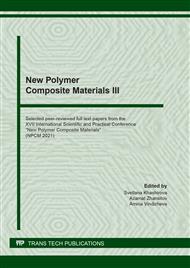[1]
C. Cleetus, S. Thomas, S. Varghese, Synthesis of petroleum-based fuel from waste plastics and performance analysis in a ci engine J. Energy (2013), p.608797 (2013).
DOI: 10.1155/2013/608797
Google Scholar
[2]
Musioł, M., Rydz, J., Janeczek, H., Radecka, I., Jiang, G., & Kowalczuk, M. (2017). Forensic engineering of advanced polymeric materials Part IV: Case study of oxo-biodegradable polyethylene commercial bag – Aging in biotic and abiotic environment. Waste Management, 64, 20–27.
DOI: 10.1016/j.wasman.2017.03.043
Google Scholar
[3]
E. Curren, C.P. Leaw, P.T. Lim, S.C.Y. Leong, Evidence of marine microplastics in commercially harvested seafood, Front Bioeng Biotechnol, 8 (2020), p.562760.
DOI: 10.3389/fbioe.2020.562760
Google Scholar
[4]
J. Guo, X.-P. Huang, L. Xiang, Y.-Z. Wang, Y.-W. Li, H. Li, Q.-Y. Cai, C.-H. Mo, M.-H. Wong, Source, migration and toxicology of microplastics in soil Environ. Int., 137 (2020), p.105263.
DOI: 10.1016/j.envint.2019.105263
Google Scholar
[5]
A. Hamza, M.A.M. Khir, M.U. Rusli, Y.S. Ibrahim, Microplastic occurrence in seaturtle nesting beach sediments from Terengganu, Malaysia Journal of Green Engineering, 10 (2020), pp.5712-5729.
Google Scholar
[6]
A. Ragusa, A. Svelato, C. Santacroce, P. Catalano, V. Notarstefano, O. Carnevali, F. Papa, M.C.A. Rongioletti, F. Baiocco, S. Draghi, E. D'Amore, D. Rinaldo, M. Matta, E. Giorgini, Plasticenta: first evidence of microplastics in human placenta Environ. Int., 146 (2021), p.106274.
DOI: 10.1016/j.envint.2020.106274
Google Scholar
[7]
G.G.N. Thushari, J.D.M. Senevirathna, A. Yakupitiyage, S. Chavanich, Effects of microplastics on sessile invertebrates in the eastern coast of Thailand: an approach to coastal zone conservation Mar. Pollut. Bull., 124 (2017), pp.349-355.
DOI: 10.1016/j.marpolbul.2017.06.010
Google Scholar
[8]
C. Wang, J. Zhao, B. Xing, Environmental source, fate, and toxicity of microplastics J. Hazard. Mater., 407 (2021), p.124357.
Google Scholar
[9]
L. Yu, E. Petinakis, K. Dean, H. Liu, Q. Yuan, Enhancing compatibilizer function by controlled distribution in hydrophobic polylactic acid/hydrophilic starch blends, J. Appl. Polym. Sci. 119(4) (2011) 2189-2195.
DOI: 10.1002/app.32949
Google Scholar
[10]
X. Liu, S. Khor, E. Petinakis, L. Yu, G. Simon, K. Dean, S. Bateman, Effects of hydrophilic fillers on the thermal degradation of poly(lactic acid), Thermochim. Acta. 509(1-2) (2010) 147-151.
DOI: 10.1016/j.tca.2010.06.015
Google Scholar
[11]
Jiang, T., Duan, Q., Zhu, J., Liu, H., & Yu, L. (2019). Starch-based Biodegradable Materials: Challenges and Opportunities. Advanced Industrial and Engineering Polymer Research.
DOI: 10.1016/j.aiepr.2019.11.003
Google Scholar
[12]
X. Ge, L. Yu, Z. Liu, H. Liu, Y. Chen, L. Chen, Developing acrylated epoxidized soybean oil coating for improving moisture sensitivity and permeability of starch-based film, Int. J. Biol. Macromol. 125 (2019) 370-375.
DOI: 10.1016/j.ijbiomac.2018.11.239
Google Scholar
[13]
L. Meng, S. Li, W. Yang, R. Simons, L. Yu, H. Liu, L. Chen, Improvement of Interfacial Interaction between Hydrophilic Starch Film and Hydrophobic Biodegradable Coating, ACS Sustain. Chem. Eng. 7(10) (2019) 9506-9514.
DOI: 10.1021/acssuschemeng.9b00909
Google Scholar
[14]
Q. Duan, L. Meng, H. Liu, L. Yu, K. Lu, S. Khalid, L. Chen, One-Step Extrusion to Minimize Thermal Decomposition for Processing PLA-Based Composites, Journal of Polymers and the Environment. 27(1) (2018) 158-164.
DOI: 10.1007/s10924-018-1323-3
Google Scholar
[15]
L. Meng, H. Liu, L. Yu, Q. Duan, L. Chen, F. Liu, Z. Shao, K. Shi, X. Lin, How water acting as both blowing agent and plasticizer affect on starch-based foam, Ind. Crop. Prod. 134 (2019) 43-49.
DOI: 10.1016/j.indcrop.2019.03.056
Google Scholar
[16]
Zain, G., Nada, A. A., El-Sheikh, M. A., Attaby, F. A., & Waly, A. I. (2018). Superabsorbent hydrogel based on sulfonated-starch for improving water and saline absorbency. International Journal of Biological Macromolecules, 115, 61–68.
DOI: 10.1016/j.ijbiomac.2018.04.032
Google Scholar


